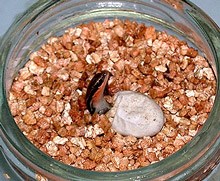
Top stories






More news


Marketing & Media
Ads are coming to AI. Does that really have to be such a bad thing?














Many traits in young reptiles are determined by the temperature of the nest, so Joshua Amiel, a PhD student in the School of Biological Sciences, and his supervisor, Professor Rick Shine, looked at how incubation temperature would affect the learning performance of these lizards.
Published in the UK's Royal Society journal Biology Letters, the research found that lizard eggs incubated at higher temperatures resulted in baby lizards with enhanced learning performance.
"Reptiles are interesting because their genes aren't the only factor that affect basic features of their biology. We know that the temperature of reptile nests influences the sex, body size, body shape and locomotor performance of hatchlings," Joshua Amiel said.
"We wanted to see whether the temperature an egg is incubated at influences the hatchling lizard's cognitive skills."
Previous studies on how features of the reptile nest environment, such as temperature or dampness, affect hatchling traits have focused on body features that are easier to measure. However, there has not been much research on how the nest environment affects behavioural traits, such as learning ability.
"Learning ability is important for all animals, because it allows them to respond to changing environmental conditions, which introduces novel challenges," he said.
"We used the native Australian lizard, Bassiana duperreyi, to test whether incubation temperature of the eggs affected the hatchling's ability to learn the location of a safe retreat site during a simulated predator attack. We selected the learning task focused on response to a predator, because being able to escape from a predator is directly relevant to an individual lizard's survival and therefore its 'fitness' in evolutionary biology terms."
The lizard eggs were incubated in either hot conditions of 22°C with daily variation of 7.5°C above and below that point, or cold conditions of 16°C with daily variation of 7.5°C above and below that point, which replicates temperature variation in natural nests located in colder higher elevations or warmer lower elevations.
Once lizards had hatched from the eggs, they were weighed and various measurements were taken. They were tested for learning ability between one and four months of age.
"Our learning test offered each lizard two possible shelters to escape to after being stimulated to run by being touched on the tail with a paintbrush. Each lizard could choose between two inverted plastic flower-pot trays - one offered a successful escape, while the other had a plastic cover that stopped the lizard from entering the flower-pot," Joshua Amiel said.
"Each lizard was trialed four times per day over four days, so we could see how quickly they learnt where the best escape spot was. Between each trial, we mixed up the sand in the experimental containers to ensure our lizards weren't using chemical cues to locate the open flower-pot, which was always in the same place.
"Overall, hot-incubated lizards achieved higher learning scores than the cold-incubated lizards, so our study adds learning ability to a growing list of traits that incubation temperature can modify in reptiles during early development."
The learning ability differences caused by incubation temperature could result from differences in hormone levels or receptors, which may induce structural variation in parts of the brain that control behaviours such as learning.
"What is significant, is that factors such as climate change or where a mother lizard chooses to make a nest affect the ability of hatchling reptiles to learn novel tasks.
"Greater learning ability can have a huge impact on the lizard's chances for survival and reproduction, so our study is the beginning of some interesting work on the influence of incubation temperature on cognitive capacity."